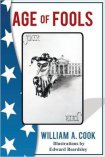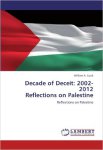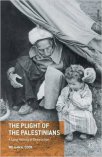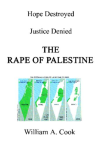Published Books (Free)
Age of Fools
Click here to order a free copy
William A. Cook's Age of Fools is an attempt to relocate our society where it belongs. It is an injection of intense humanism, a celebration of creative thinking that encourages creative reading. - Gilad Atzmon, Israeli-born British Jazz Artist, Author & popular Critical Analyst of Mid-East and Global Affairs. Read more of this review
Decade of Deceit: 2002-2012 Reflections on Palestine
Click here to order a free copy
The Chronicles of Nefaria
The Chronicles of Nefaria
by William A. Cook
"The Chronicles of Nefaria" is short fiction, Kafkaesque in attitude, drawing on current events happening in the mid-east, metamorphosed into a surreal world that exemplifies the horror of leaders devoid of humanity. More information
The Mandate
by William A. Cook
The year is 1934, late fall, and Richard Catling slouches pensively against the train’s window on his way from London to Bungay where he went to school and where his father farms a few acres of mud furrowed fields in a vain attempt to keep the family’s home as the depression spreads ever more deeply in the rural countryside. (bio and obituary) Rain and sleet strike against the window creating a cacophony of clashing sounds with the clack, clack of the iron wheels below and the screeching wind that enters through the rocking clatter of the door at the end of the car.
The Plight of the Palestinians: A Long History of Destruction
Click here to order a free copy
Tracking Deception
Click here to order a free copy
A compelling indictment of the Bush-sponsored New World Order of endless wars against Arabs/Moslems, relentlessly promoted by a nauseating campaign of deceit and lies at the highest levels of the US Administration in complicity with a corrupt self-serving corporate media, at the behest of a greedy so-called corporate 'elite' and of the aggressive fundamentalist pro-Israel Washington, DC lobbies. - Anthony Yuja
The Rape of Palestine
Click here to order a free copy
"The Rape of Palestine" offers an American's perspective on the last four years of the systematic genocide taking place in Palestine. Cook provides an in-depth analysis on the inhumane actions and policies of the Sharon and Olmert administrations as they defy the resolutions of the United Nations, the Geneva Accords, the Universal Declaration of Human Rights, and the International Court of Justice. He analyzes the total lack of moral behavior that results from the Zionist imposition of their secular ideology that operates in consort with the Neo-Con operatives in the Bush Administration with the full support of AIPAC. The book is a composite of articles published over the last four years that complements his earlier volume "Tracking Deception: Bush Mid-East Policy" published in 2006. Together they represent a damning indictment of leaders in both countries that are psychopathic in nature, virtually immune to conscience or empathy for fellow human beings.”









